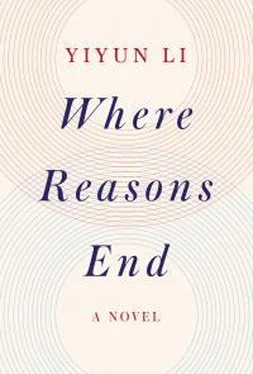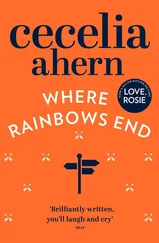Do you want me to feel sad for myself, too? Nikolai said.
I thought about the question. I didn’t know the answer.
I’m not as sad as you think, he said. Not anymore.
I didn’t need him to tell me that, but wouldn’t it be good, my child, if you could still feel sad as I do, because then you could feel other things as I do, too? But I didn’t say these words to him. Instead, I told him a story about my high school classmate’s mother.
The woman grew up on an island in Indonesia. One day she climbed a coconut tree to pick a coconut for her little sister, and plunged from the tree. She did not die but lost most of her hearing from the accident. Later she became a pianist and taught in a conservatory. You had to shout into her ear for her to hear you. I’d never seen her play piano or teach. It was a mystery to me how she could do either.
Beethoven was deaf, too, Nikolai said.
Only later in his life. She was deaf since she was seven.
Was her life more of a tragedy than Beethoven’s?
No, of course not, I said. The reason I was telling you the story was that I now remember she liked me a lot.
As I was talking, more details about the woman and her daughter came to me, the first time I had thought of them in thirty years. My friend was a wild, unruly girl of sixteen, with hair cut by herself, unevenly in the back and front. She failed the college entrance exam and we drifted apart. I had heard she had become a freelance photographer.
The friend’s mother liked to keep me next to her, feeding me sugared citrus and tea when a group of us visited their apartment. She and I rarely talked, but we smiled at each other often. She was an odd woman, half a head taller than her daughter, who was among the tallest in my class, and she was helplessly quiet in front of her daughter, who often joked that I was a perfect companion for her mother.
Not only this friend’s mother, I said. Back then I happened to be liked by all my friends’ parents.
I am not liked by all my friends’ parents, Nikolai said with some pride.
I know. I admire you for that, I said. All the same, they still cry for you.
It doesn’t matter now, he said.
Had it been me at sixteen, many of my friends’ parents would have thought it an inexplicable tragedy. But that knowledge would not have made the world less bleak for me. I hadn’t thought about my friend’s mother for decades. Other than a few facts about her life and her smile, I didn’t know her at all, nor she me.
I suppose you’re right, I said. Still, I wish you knew how much you are missed by many people.
Mommy, Nikolai said, and the way he said it almost made me weep. Mommy, you know that’s a cliché.
What if life could be saved by clichés? What if life must be lived by clichés? Somewhere tomorrow and somewhere yesterday—never somewhere today but cliché-land.
You promised that you would understand, Nikolai said.
Understanding I had promised him. And other things, too: a house in the woods, a kitchen with sunlight, many new recipes, rights to my books—after you die I want the rights to the books you’ve written, but only the good ones, he had said to me at nine. Yet all these promises were as inadequate as love, promise and love being two anchors of cliché-land.
That doesn’t change how sad I am, I said.
But you wouldn’t want people to feel sad all the time if you were me.
I was almost you once, and that’s why I have allowed myself to make up this world to talk with you. Sadness one can live with, but sadness is a helpless garrison against the blindness of tragedy. A mother and a child cannot be contemporaries at any given age, and for that reason my sixteen-year-old self could not befriend yours. Each refusing to be saved, we could not save each other when young. Older—and you were still young—I was the White Queen who put up the sign. Do not let mother dear find us. You were the one better at hiding.
2
Waylaid by Days
Now we have our own rules, I said. A step toward somewhere, isn’t it?
I didn’t say how it had made breathing possible. Life, if not lived, is carried by automatic actions, breathing an inevitable one among them. Once at a party someone asked what were the qualities in other people that set one off. I said imprecision.
As though we haven’t always lived by our own rules, Nikolai said. His tone, I imagined, would be the same as when he had once said—after I questioned what other mothers would think of his outfit, unsuitable for a concert he was going to—you don’t even care what others think of you.
Have we always lived by our own rules? But more than the question, I was confused by the tense we used. Queries had been made, and advice given, regarding in what tense I spoke about Nikolai. Yet what makes was different from is, has been from will be ? Timeless is this world we are making, tenseless its language.
Rules are set to be broken, he said.
Deadlines are set to be missed, I said. Deadline as a word used to fascinate me, a word that connects time and space and death with such absoluteness.
Promises are made not to be kept, he said.
Love is made not to last, I said. A contestable statement, though he chose not to argue. Love was the word we had used at his leave-taking, he knowing it was final, I sensing it was the case. But between sensing and knowing there were seven hours and four states. Only today did I register that people often in their condolence letters called the loss unfathomable. The distance at the moment of loss could be calculated: 189,200 fathoms. (What does it matter that fathom is no longer used to measure from here to there? To obsolete is to let age, from which death is exempted.)
Not clear, though, is how to fathom time: from a moment to…Can forever be the other end point?
But why does it bother you if you insist time does not apply to us anymore? Nikolai said. Omniscience was taken for granted in this world where we met now, but omniscience I let only him claim. You’re breaking your own rules, he said.
Because time still confines and confuses me, I said.
Poor you, he said. Waylaid by time.
Waylay, I said. I’ve never used it in my writing.
No offense, but you don’t have an expansive vocabulary.
Luckily my mind is not limited by my vocabulary, I said. (In my head I used the same tone that I had used when Nikolai had introduced me to his kindergarten class: My mom is an immigrant so she speaks English with an accent. Thank you my dear, I had said then, but I still make a living by writing in English.)
He turned quiet. I understood. Who wants to hear a mother boast about herself?
I turned quiet, too. I was in a subway car. Only a few weeks ago, Nikolai had asked me if it was always this loud underground. We had been on the way to meet my friend, as I was doing today. I can’t live in New York, he had said then. I can’t afford to lose my hearing.
It occurred to me, when I remembered his words now, that I had never paid attention to the noise. I had known I was not sensitive to colors, but to sounds also?
How have I lived so blindly and deafly? I said. Perhaps he had gained knowledge to explain that to me.
He did not reply. He was eavesdropping on a man and a woman standing next to me. I was late to their story. They were talking about a boy who had killed himself the week before, the son of a mutual acquaintance.
Seventeen, the man said. Can you believe it?
Oh my god, the woman said. I read it in the papers. I thought to myself, Someone’s grandson.
Imagine being woken up by that phone call, the man said. How can anyone believe it’s real?
I waited for Nikolai to say something. He would not defend the other boy, I knew that. They each had their own reasons to make a decision that looked similar only to those wanting an explanation. But I wondered if he would say something clever, that people’s sympathy and callousness are like two hands wringing over someone else’s disaster. Or, would he poke fun at them on my behalf? Of course you knew it was real right away, did you not? he would say. How can anyone ask a question starting with that silly phrase How can anyone.
Читать дальше












